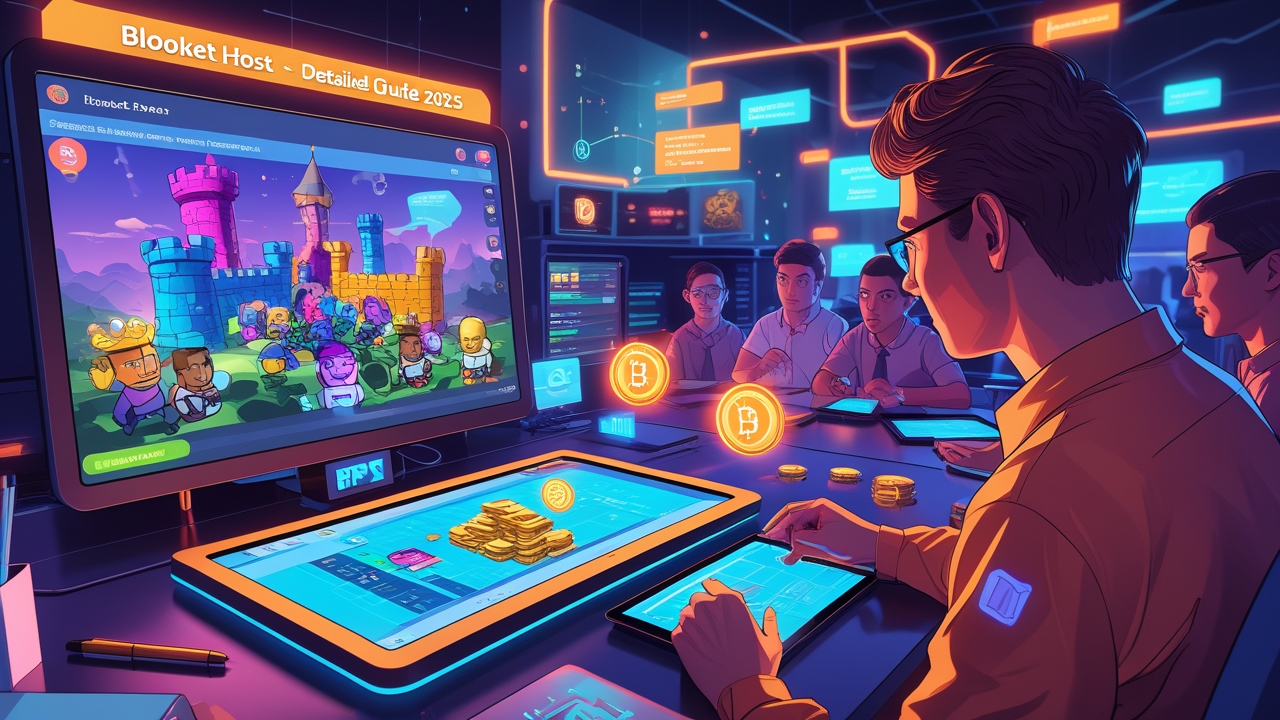Blooket has revolutionized classroom engagement by transforming traditional quizzes into dynamic, game-based learning experiences. As a Blooket host, you control the entire gaming environment, from selecting question sets to managing live sessions with real-time player interaction. The platform’s hosting capabilities have expanded significantly in 2025, offering enhanced customization options, improved analytics, and streamlined management tools that make it easier than ever to create memorable educational experiences.
Table of Contents
Whether you’re a teacher looking to boost student participation or an educator seeking innovative assessment methods, mastering Blooket’s hosting features opens up endless possibilities for interactive learning. The host role goes beyond simply starting a game – you become the orchestrator of an engaging educational experience that can accommodate different learning styles, pace preferences, and classroom dynamics.
Key Takeaways
- Blooket hosting requires a free account and allows you to control game settings, player management, and real-time session monitoring
- The platform offers multiple game modes with different hosting requirements, from quick Tower Defense sessions to extended Gold Quest adventures
- Advanced host settings include time limits, late joining permissions, random name generation, and detailed post-game analytics
- Successful hosting depends on choosing appropriate game modes for your audience, setting clear expectations, and actively monitoring player progress
- Blooket Plus subscribers gain access to enhanced player limits, advanced reporting features, and exclusive game modes for premium hosting experiences
Getting Started as a Blooket Host
Creating your first hosted Blooket game begins with understanding the platform’s hosting infrastructure. Unlike student accounts that focus on gameplay, host accounts provide comprehensive control over the entire gaming experience. The hosting dashboard serves as your command center, where you’ll manage question sets, configure game parameters, and monitor live sessions.
Account Setup Requirements
Any Blooket account can host games, but the experience varies significantly between free and premium tiers. Free accounts support up to 60 players per session, while Blooket Plus subscribers can accommodate larger groups. The registration process is straightforward – you’ll need an email address and can immediately start hosting after email verification.
Teacher accounts receive additional features including detailed student progress tracking, assignment capabilities, and enhanced reporting tools. These accounts integrate seamlessly with Google Classroom and other learning management systems, making it easier to incorporate Blooket sessions into existing curricula.
Navigating the Dashboard
The host dashboard organizes essential functions into intuitive sections. The “Discover” tab contains thousands of pre-made question sets covering various subjects and grade levels. Your personal “My Sets” section houses custom question collections you’ve created or favorited. The “News” section keeps you updated on platform changes, new features, and seasonal content releases.
The hosting interface prioritizes efficiency. Large, clearly labeled buttons guide you through the setup process, while preview options let you review questions and settings before going live. The dashboard also tracks your hosting history, allowing you to quickly recreate successful game sessions.
Step-by-Step Hosting Process
Hosting a Blooket game follows a systematic workflow that ensures smooth session launches. The process involves four main phases: content selection, game mode choice, setting configuration, and session initiation. Each step offers customization opportunities that directly impact player experience and educational outcomes.
Finding or Creating Question Sets
Question sets form the foundation of every Blooket game. The platform’s discovery system uses filters for subject, grade level, and question count to help you find appropriate content. Popular categories include math facts, vocabulary building, science concepts, and standardized test preparation.
When creating custom question sets, focus on clarity and engagement. Each question supports multiple-choice answers with one correct option. The question editor includes formatting tools for mathematical expressions, and you can import questions from spreadsheets for bulk creation. Well-crafted questions should be concise, unambiguous, and age-appropriate for your target audience.
Selecting Game Modes
Game mode selection significantly affects session dynamics and player engagement. Each mode offers unique mechanics that cater to different learning objectives and time constraints. Tower Defense works well for quick review sessions, while Gold Quest provides extended gameplay with strategic elements that keep students engaged for longer periods.
Consider your audience when choosing modes. Younger students often prefer action-oriented games like Battle Royale, while older learners might appreciate the strategic depth of Crazy Kingdom. The mode you select determines available customization options and typical session duration.
Configuring Game Settings
Advanced game settings allow you to tailor sessions to specific classroom needs. Time limits create urgency and maintain pace, while achievement-based endings let students progress naturally. Player management options include late joining permissions, which accommodate tardy arrivals, and random name generation for privacy protection.
The settings panel also controls question randomization, answer shuffling, and bonus multipliers. These options prevent cheating while maintaining educational integrity. Preview mode lets you test configurations before going live, ensuring everything works as intended.
Game Modes and Selection Strategy
Understanding each game mode’s mechanics and optimal use cases helps you create more effective learning experiences. Blooket offers over a dozen distinct game modes, each with unique rules, time requirements, and engagement patterns. Strategic mode selection can transform routine assessments into memorable learning events.
Live Hostable Game Modes
The most popular hosted game modes include Tower Defense, Gold Quest, Battle Royale, and Crazy Kingdom. Tower Defense challenges players to answer questions quickly to build defensive structures, making it ideal for math facts and vocabulary drill. Gold Quest combines exploration with question-answering, encouraging sustained engagement through treasure hunting mechanics.
Battle Royale eliminates incorrect players progressively, creating dramatic tension that keeps everyone focused. This mode works exceptionally well for review sessions before major assessments. Crazy Kingdom lets players build medieval empires by answering questions correctly, appealing to students who enjoy strategy and progression systems.
Choosing the Right Mode for Your Audience
Age and attention span considerations should guide your mode selection process. Elementary students typically respond well to visually engaging modes like Tower Defense and Gold Quest, which provide immediate feedback through colorful animations. Middle school learners often prefer competitive modes like Battle Royale that add social dynamics to the learning process.
Subject matter also influences optimal mode choice. Fast-paced modes work well for factual recall, while strategic modes suit complex problem-solving scenarios. Consider the learning objective – are you reinforcing known concepts or introducing new material? Different modes support different pedagogical approaches.
Advanced Host Settings and Customization
Beyond basic game setup, Blooket offers sophisticated customization options that experienced hosts use to create tailored learning experiences. These advanced settings affect everything from session pacing to player behavior management. Understanding these options enables you to optimize sessions for specific educational goals and classroom dynamics.
Time Limits vs Achievement-Based Endings
Session duration settings significantly impact learning outcomes and student engagement. Time-based limits create consistent session lengths that fit into class periods, but they may cut off engaged students prematurely. Achievement-based endings allow natural conclusion points but require careful monitoring to prevent excessively long sessions.
Consider hybrid approaches for optimal results. Set generous time limits with achievement targets that most students can reach within the allotted period. This combination provides structure while accommodating different learning paces. For assessment purposes, time limits ensure fair evaluation conditions.
Player Management Options
Effective player management starts before students join your session. Name approval settings let you review student usernames before they appear in-game, preventing inappropriate choices. Random name generators provide fun alternatives while maintaining classroom decorum.
Late joining permissions accommodate real-world classroom situations where students arrive after game start. However, this setting affects competitive balance in some modes. Consider your priorities – inclusivity versus fair competition – when configuring these options.
Random Names and Account Settings
Privacy considerations make random name generation increasingly important. This feature assigns fun, appropriate usernames automatically while protecting student identity. The system includes thousands of combinations using animals, colors, and objects that students find entertaining.
Account requirements represent another privacy consideration. Allowing guest play increases accessibility but limits your ability to track individual progress. Requiring accounts enables detailed analytics but may create barriers for some students.
Managing Live Game Sessions
Active session management separates exceptional hosts from those who simply start games and step away. Real-time monitoring allows you to address issues immediately, maintain engagement, and gather valuable insights about student understanding. The live management interface provides multiple tools for session oversight and intervention.
Sharing Game Codes and QR Codes
Student access methods significantly affect session start efficiency. Game ID codes work well for students familiar with the platform, but QR codes eliminate typing errors and speed up the joining process. Display both options prominently and consider creating visual aids for younger learners.
The join screen shows connected players in real-time, allowing you to verify attendance before starting. Use this opportunity to address technical issues and ensure everyone can participate. The interface also displays connection quality indicators that help identify potential problems.
Monitoring Player Progress
The live progress dashboard reveals individual and class-wide performance patterns in real-time. Color-coded indicators show which students struggle with specific concepts, enabling immediate intervention or clarification. This data helps you adjust pacing and provide targeted support during gameplay.
Watch for engagement patterns that indicate confusion or disengagement. Students who stop answering questions or show dramatic performance changes may need additional support. The monitoring tools help you identify these situations quickly.
Post-Game Analysis and Reports
Comprehensive analytics distinguish Blooket from simple quiz platforms. Post-game reports provide detailed insights into individual and class performance, question difficulty, and engagement metrics. These data points inform instructional decisions and help identify areas requiring additional reinforcement.
Understanding Game Reports
Game reports include multiple data visualizations that reveal different aspects of student performance. Overall accuracy percentages show class-wide understanding levels, while individual breakdowns highlight students who need additional support. Question-by-question analysis identifies concepts requiring reteaching.
Response time data adds another analytical dimension. Students who consistently answer quickly but incorrectly may be guessing, while those who take excessive time might lack confidence or understanding. These patterns help you tailor future instruction.
Using Data for Educational Insights
Transform game data into actionable educational strategies by analyzing performance patterns across multiple sessions. Consistent difficulty with specific question types indicates curriculum gaps, while improving performance trends show successful intervention effects.
Compare performance across different game modes to understand how presentation affects learning. Some students may excel in competitive environments while others perform better in collaborative settings. This information guides future session planning.
Troubleshooting Common Host Issues
Even experienced hosts encounter technical difficulties and unexpected situations during live sessions. Understanding common problems and their solutions helps you maintain smooth gameplay and minimize disruptions. Proactive troubleshooting preparation prevents minor issues from derailing entire sessions.
Connection and Loading Problems
Network connectivity issues affect both hosts and players differently. Hosts experiencing connection problems should check their internet stability and consider switching devices or browsers. Chrome and Firefox typically provide the most reliable performance for hosting sessions.
When students report joining difficulties, verify that your game session remains active and the game ID hasn’t changed. Sometimes refreshing the host screen resolves display issues that prevent new connections. Keep backup devices available for critical sessions.
Player Limit and Technical Issues
Free accounts hitting the 60-player limit receive clear notifications, but managing this situation requires quick decision-making. Consider creating multiple simultaneous sessions for large groups, though this requires additional supervision. Blooket Plus subscriptions eliminate this constraint for most classroom situations.
Browser compatibility problems occasionally affect older devices or restrictive network environments. Maintain a list of known working configurations and alternative access methods for students with technical limitations.
Advanced Hosting Strategies
Experienced hosts develop sophisticated strategies that maximize educational impact while maintaining high engagement levels. These approaches go beyond basic gameplay to create meaningful learning experiences that students remember long after sessions end. Advanced strategies often involve multiple sessions, varied formats, and integration with broader educational objectives.
Team-Based Competition
Organizing team competitions requires careful planning but produces exceptional engagement and collaborative learning. Divide classes into balanced groups and run simultaneous sessions, comparing results afterward. This approach encourages peer teaching and creates natural discussion opportunities about challenging questions.
Consider rotating team membership across multiple sessions to prevent static groupings. Mixed-ability teams often produce better learning outcomes than homogeneous groups, as stronger students naturally support their teammates.
Integration with Lesson Plans
Strategic Blooket integration amplifies lesson effectiveness rather than replacing traditional instruction. Use games as formative assessments to gauge understanding before moving to new topics. Post-lesson review sessions reinforce key concepts while maintaining engagement.
Create question sets that align with specific learning standards and objectives. This alignment transforms games from entertainment into legitimate educational tools that contribute directly to curriculum goals. Document successful integrations for future reference and sharing with colleagues.
Blooket Plus Features for Hosts
Premium subscription benefits significantly enhance the hosting experience through increased capacity, advanced analytics, and exclusive content access. While free hosting serves many educational needs, Blooket Plus unlocks features that benefit serious educational users and larger institutions.
Enhanced Player Limits
Blooket Plus raises player limits to 300 participants per session, accommodating school-wide events, large lectures, and multi-class competitions. This expansion enables entirely new use cases like grade-level competitions and parent engagement events.
Higher limits also provide flexibility for regular classroom use. You’ll never worry about excluding students or splitting classes unnecessarily. The enhanced capacity supports collaborative learning approaches that involve multiple classes working together.
Advanced Analytics
Premium analytics include historical trend analysis, detailed performance comparisons, and exportable data formats that integrate with gradebooks and learning management systems. These tools transform Blooket from an engagement platform into a comprehensive assessment solution.
Advanced reporting helps identify long-term learning patterns and measure growth over time. Export capabilities enable deeper analysis using external tools or sharing data with administrators and parents. These features particularly benefit data-driven educators who use multiple metrics to guide instruction.





